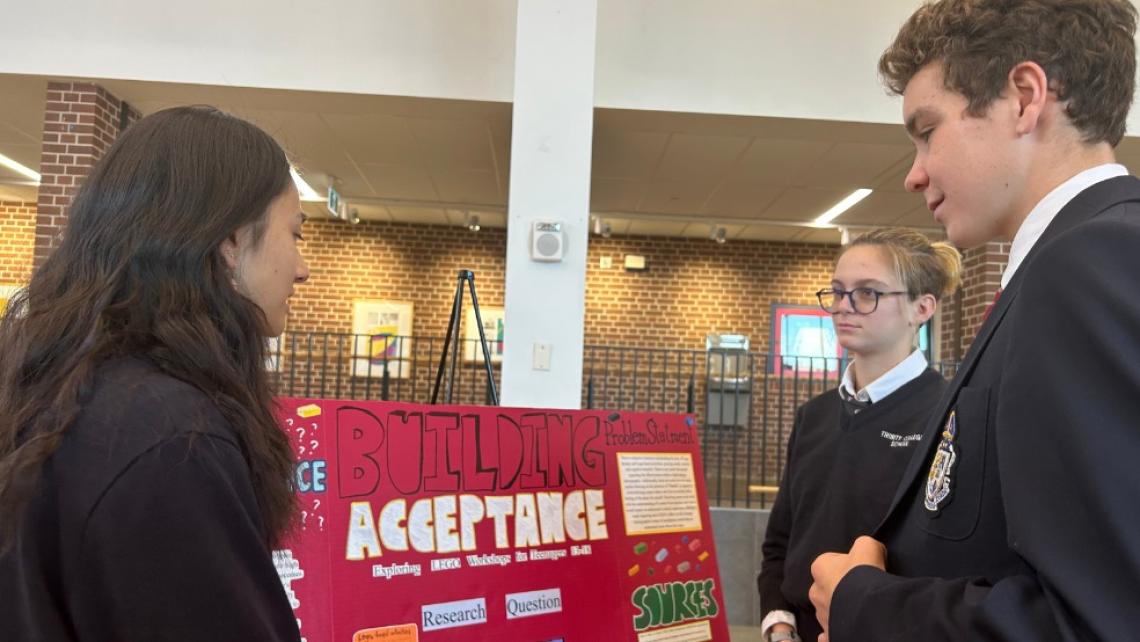Students in the Advanced Placement Research course at Trinity College School have just begun their intensive, months-long projects for the year, and their work is being guided by some big questions.
AP Research is part of the AP Capstone program, a two-year course of study that begins in Grade 11 with the AP Seminar course, where students learn how to use different lenses and perspectives to research, write and present on a range of topics. With this foundation, students can move onto the Grade 12 AP Research course, where they undertake their own research project, starting in September and culminating in May with a 5,000-word research paper, presentation and oral defense related to their original research findings.
On Tuesday, October 24th, the students in this year’s AP Research course invited students and staff to Cirne Commons during morning break to learn about their preliminary research questions. These questions are the foundation of the students’ research, but will be refined and shaped over the course of their work throughout the year. The researchers created displays to showcase their early work, and were on hand to take questions and hear feedback that may help them to further consider their projects.
As a next step in the process, on Friday, October 27th the students and their teachers – Mr. Myke Healy and Ms. Shelagh Straughan – will head to the Douglas Library at Queen’s University to explore the resources there.
This year’s AP Research students and their preliminary research questions are:
- Anna Dobrinski – “To what extent does the paradox of choice influence the effectiveness at which secondary school students are able to make a decision regarding post-secondary education?”
- Reina Chen – “To what extent do Lego-based activities affect teenagers’ (13-18) sense of acceptance?”
- Aoo Audsabumrungrat – “To what extent does acute tea intake in non-habitual caffeine consumers induce ‘flow’ in cognitive tasks?”
- Hebe Lu – “To what extent has globalization impacted the preservation/evolution/ dissemination of traditional art performances across diverse cultures?”
- Nya Fludzinski – “To what extent does the romanticization and glorification of famous serial killers in films minimize and normalize the violence of their crimes to viewers?”
- Nolan McReelis – “To what extent does particulate matter in wildfire smoke impact the growth of garden cress plants?”
- Sela Schunk – “To what extent does the fingernail nail polish colour of people who identify as women influence the perception that other females in their social life have about them?”
- Eason Chen – “What effect do Korean idols have on Chinese teenagers’ perception of physical appearance?”
- Natalya Viznyak – “To what extent has AI-generated music affected the music industry?”
- Haron Wang – “To what extent does learning about the potential health implications of artificial sweeteners change consumption behaviour?”
- Eric Jin – “What is the effectiveness of Arabidopsis halleri in the process of phytoextraction of zinc and cadmium?”
- Arthur Jackman – “What is the role of Daoist imagery in understanding themes of disillusionment with contemporary Japanese society within Haruki Murakami’s The Wind-Up Bird Chronicles?”
- Celina Zhou – “How does growing peppermint in an indoor greenhouse environment rather than its natural habitat affect the plant’s medicinal properties?”
- Sienna Taylor – “To what extent did Fenty Beauty influence a domino effect in diversity in the cosmetic industry after its release in 2017?”
- Monya Paine – “How does ancient folklore represented in fiction affect the revival of cultural identity in a population?”






